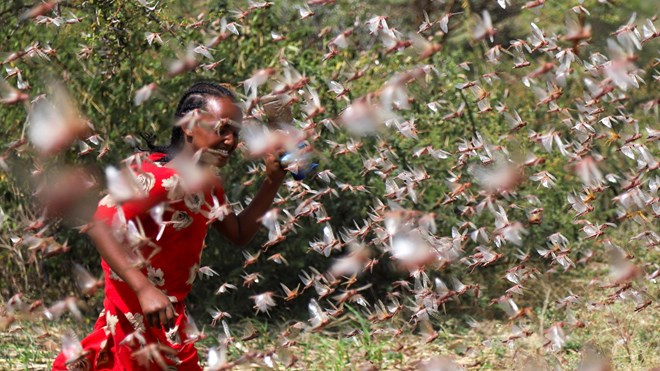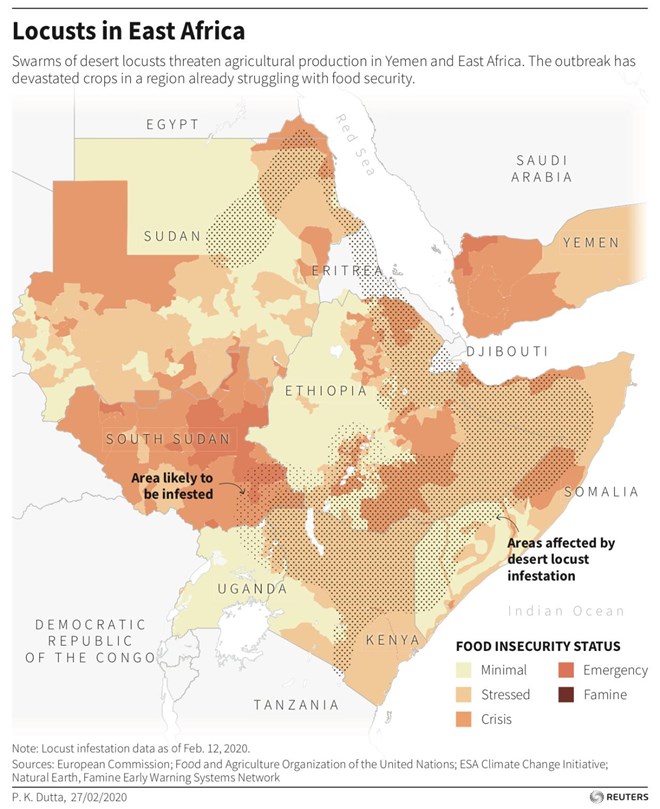
Thursday May 14, 2020
By Samuel Getachew

REUTERS/GIULIA PARAVICIN
Up to one million hectares of farm land need to be controlled and treated with pesticide if Eastern Africa and Yemen are to have a good chance of avoiding a food security crisis in the wake of an unprecedented plague of locusts expected in the next month, warns the UN’s Food and Agriculture Organization (FAO).
But the FAO and other organizations have already helped avoid an early crisis with notable gains made against swarms of the migratory pests saving up to 720,000 tonnes of wheat, which it says would normally feed up to 5 million people.
The threat of locust swarms affects ten African countries in the Greater Horn of Africa: Djibouti, Eritrea, Ethiopia, Kenya, Somalia, South Sudan, Sudan, Uganda, Tanzania and Yemen in the Middle East. Desert locusts are considered the most destructive migratory pest in the world, the FAO says a single swarm can cover one square kilometer and contain up to 80 million locusts.
Even though progress has been made by treating land, the first wave of swarms has reproduced and a larger second wave will transition to the young adult stage in June when they’ll flight during the critical harvest season of Eastern Africa.The combination of the Covid-19, recent floods and the locusts have put immense pressure on local and international resources to provide aid and support for farmers and people in the region.
While each country is advised to develop its own organizational structure and logistics based on swarm infestations and breeding areas, an early appeal started in January had raised $130 million by the end of April or 85% of FAO’s target. This will protect the livelihoods of 110 000 households, and assist with providing information and coordination to stakeholders across the region, the UN body said.

Across the ten countries, over 365 000 hectares have been controlled to date, of which an estimated 20% was infested by hopper bands and 80% by swarms, says FAO’s report.Up to 70% of the total budget needed to prevent further spread of plague of locusts in Ethiopia and Somalia has been committed. It comes as Ethiopia’s agriculture ministry reports over 350,000 tonnes of crop has been damaged by locusts so far, exacerbating the already fragile food security situation in the country.
Until last year, there was 26 million food insecure people in Ethiopia, a home to more than 100 million people. Of this, eight million people were in need of urgent assistance, while another four million people were under safety net programs.
“Between 25 and 30 million additional people would be food insecure due to the damages caused by locusts swarms, coupled with COVID-19 crisis,” said Umer Hussien, Ethiopia’s agriculture minister. He says an additional 4 million to 5 million tonnes of crop must be produced in response.
Since early 2019, Ethiopia, along with Somalia, has been at forefront of the desert locust surveillance and control operations, according to FAO. A damage on 190,588 hectares of land is so far contained using pesticides, according to a new progress report on the response in the Greater Horn of Africa and Yemen.
Nonetheless, FAO, in the report, warned that farmers who lose their crops between April and June will have no food stocks from late June until December 2020.
“Locust invasion, coupled with Covid 19, will tremendously affect our food security unless concerted efforts are made”, Yifru Tafesse, a senior director with the Ethiopian Agricultural Transformation Agency told Quartz Africa.
Ethiopia’s agriculture ministry estimates production will decrease by up to 8%. The Ethiopia’s government in its part, disclosed its preparedness to produce 37.9 million tonnes of crop in the coming rainy season, which will start a month later.
About 1.2 million hectares of land that was left idle also cleared for cultivation to boost production to prevent food crisis driven by locusts plague and the coronavirus, according to the Minister of Agriculture.
“We have also distributed [860,000 tonnes] of fertilizer as a part of efforts to increase food production,” said Hussien.
Two weeks ago, FAO donated three aircrafts to Ethiopia, bringing the total available aircrafts to five in the country. The move comes as fears grow the impact of locust will accelerate by the end of the rainy season.
Although efforts to curb the spread of the virus is progressing well, the UN body said it is yet to estimate the extent of the damage, although 2.5 million people are likely to be impacted under mid-case scenario.